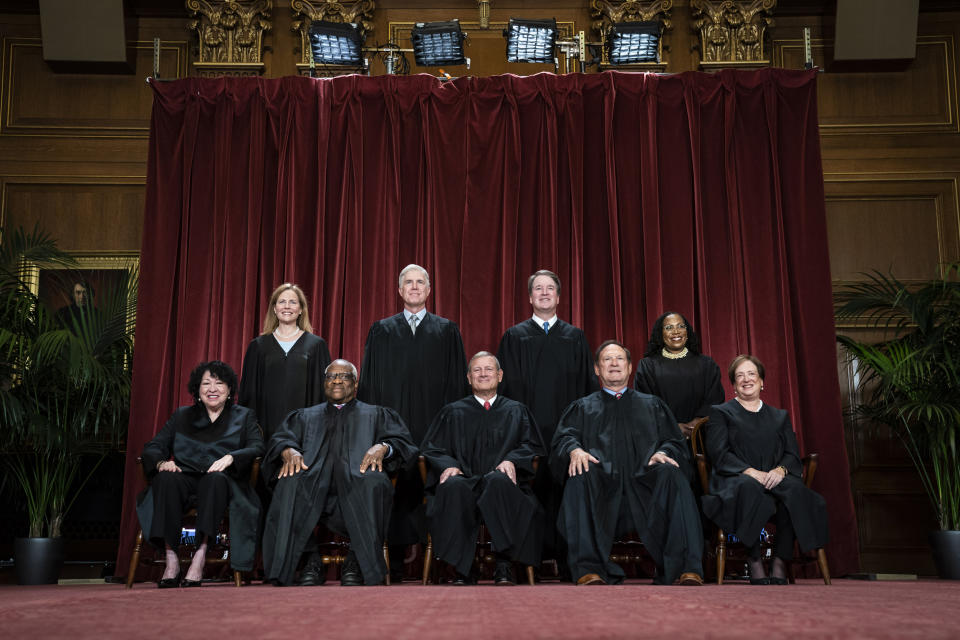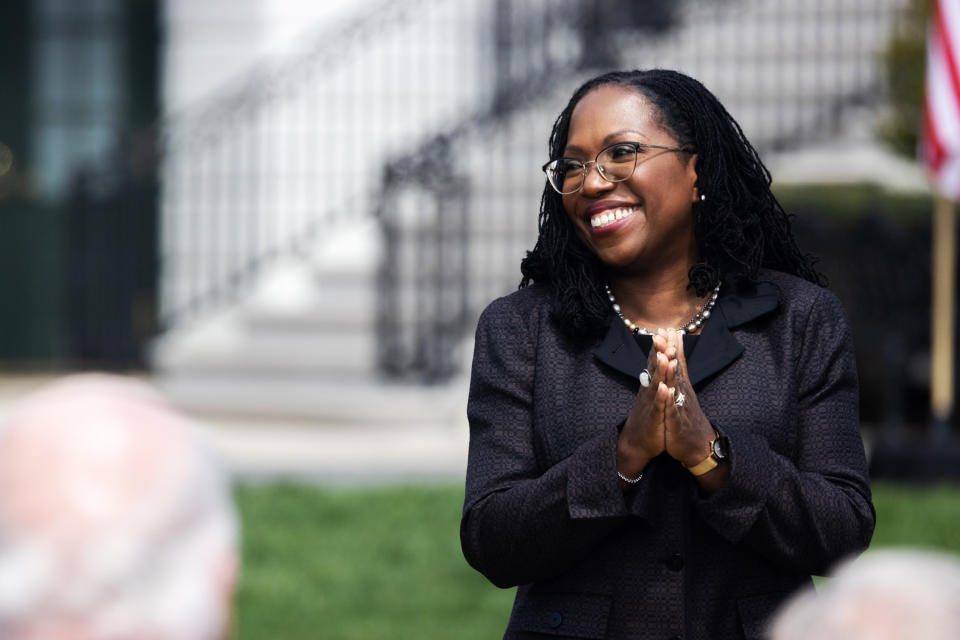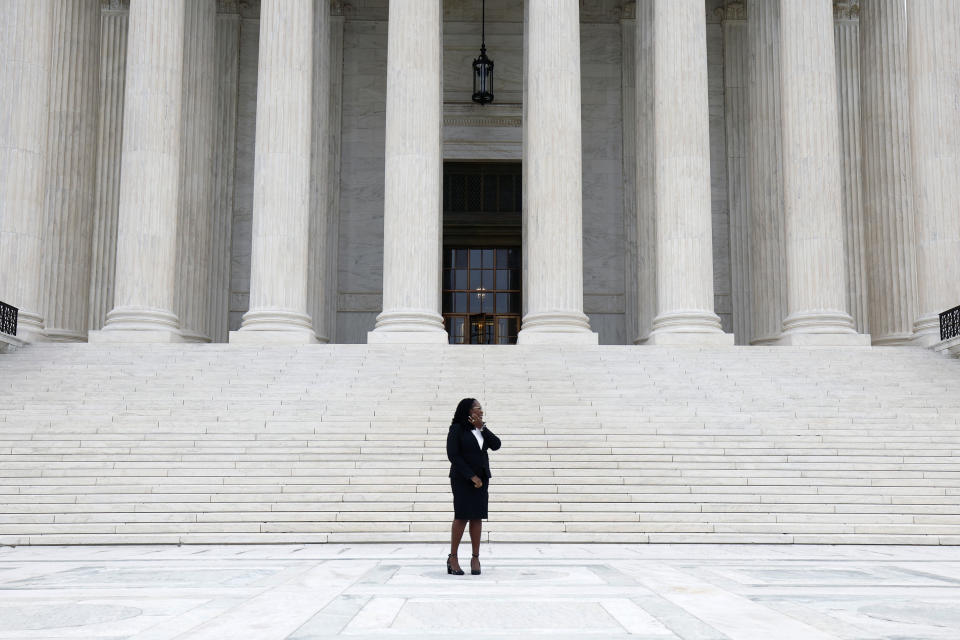'Unabashed': Justice Jackson marks her first year on the Supreme Court unafraid to stake her own position
- Oops!Something went wrong.Please try again later.
- Oops!Something went wrong.Please try again later.
- Oops!Something went wrong.Please try again later.
- Oops!Something went wrong.Please try again later.
- Oops!Something went wrong.Please try again later.
- Oops!Something went wrong.Please try again later.
WASHINGTON — When the Supreme Court ruled in June against labor unions, allowing an employer to pursue a damages claim for losses caused by a strike, there was just one dissenting voice: Justice Ketanji Brown Jackson's.
"Today, the court falters," Jackson wrote, adding that the decision “risks erosion of the right to strike.”
Her lone dissenting vote was a notable moment in a high-stakes first term for the first Black woman to serve on the court.
Although Jackson, 52, is clearly a solid part of the liberal minority on the 6-3 conservative-majority court, her opinion in Glacier Northwest v. International Brotherhood of Teamsters illustrated how she was forthright and eager to have her voice heard, even when she was out on her own.

Her solo opinion marked the first time a new justice has made such a bold move in a first term on the court since conservative Justice Clarence Thomas did so in 1991, according to Supreme Court stats guru Adam Feldman. (Conservative Justice Neil Gorsuch, who joined the court midway through the 2016-2017 term, wrote a solo dissent in the following term after he'd joined.)
"Her unabashed willingness to articulate a perspective that is contrary to that held by the majority of justices has made her the most formidable dissenting voice on the court," said Sherrilyn Ifill, a prominent civil rights lawyer.
At the end of the nine-month court term that ended Friday, the focus was on the major cases on affirmative action, student loan debt forgiveness and LGBTQ rights in which the court was divided on ideological lines with Jackson and her two liberal colleagues in dissent.
Jackson's clash with Thomas, the only other Black justice on the court, on their seemingly unresolvable differences on race and the Constitution generated headlines as they exchanged barbs in separate opinions in the ruling that effectively ended the broad consideration of race in college admissions.
Appointed by President Joe Biden to replace fellow liberal Justice Stephen Breyer, who retired in the summer of 2022, Jackson reflected the administration's commitment to diversifying the court in terms of race, gender and professional background.
'Enlightenment'

Before she was appointed as a district court judge in Washington by former President Barack Obama, Jackson had served as a public defender. Biden appointed her to a federal appeals court in 2021 before elevating her to the Supreme Court the following year.
Jackson made her presence felt on her first day in the Supreme Court's ornate courtroom in October, asking a series of polite but insistent questions, setting a trend that would continue throughout the term.
"Let me try to bring some enlightenment to it," she said on that first day, when the court was hearing a knotty case about federal authority to regulate wetlands under the Clean Water Act.
She ended up speaking more at oral arguments during the course of the term than any other justice, according to Feldman. Based on the number of words spoken, she beat the next most talkative justice, fellow liberal Sonia Sotomayor, by an average of 600 words per argument, he found.
Sometimes new justices are more likely to keep their own counsel when first joining the court, although a new oral argument format introduced during the pandemic — with each justice given a chance to weigh in replacing the previous free-for-all format — is likely part of the explanation.
For some court watchers, what's more important is what Jackson talks about than how many words she uses to say it.
When the court in October heard oral arguments over a conservative attempt to weaken further the landmark Voting Rights Act, Jackson was quick to counter the notion that the Constitution's 14th Amendment was "colorblind," noting that it was aimed at redressing historical harms to Black people following the Civil war and the end of slavery.
"I don't think the historical record establishes that the founders believed that race neutrality or race blindness was required, right?" she said.

The court ended up affirming its previous approach to addressing racial discrimination claims in redistricting cases, with Jackson revisiting the theme less successfully when the conservative majority struck down affirmative action in college admissions.
On certain issues, Jackson has fostered a cross-ideological alliance with Gorsuch. Although Gorsuch is often in lockstep with his conservative colleagues on contentious issues, his idiosyncratic libertarian views sometimes align him with his liberal colleagues.
One example occurred in May when the court ruled unanimously in favor of a 94-year-old woman over her claim that a Minnesota county had violated the Constitution by keeping a $25,000 profit when it sold her home in a tax foreclosure sale.
The court ruled that the woman, Geraldine Tyler, could pursue her claim that the county's actions violated the takings clause of the Constitution's Fifth Amendment, which requires that the government pay compensation when a property is seized.
The court had no need to address a second legal question raised in the case: whether the county had also violated the excessive fines clause of the Eighth Amendment. Gorsuch wrote separately to suggest that Tyler's claim on that point could be valid too. Jackson was the only other justice to join his opinion.
Jackson's occasional alliances with Gorsuch also show how she and her fellow liberals on the court, Sotomayor and Justice Elena Kagan, don't act as a single bloc.
When the court on May 11 rejected a challenge to an animal welfare law that bans pork products derived from pigs housed in confined spaces, the vote was 5-4, with the justices split on nonideological lines. Jackson dissented, along with three conservatives, while Sotomayor and Kagan were in the majority.
As is normal with new justices, Jackson's five majority opinions for the court have been in uncontroversial cases, such as her first, in February, in a dispute between Delaware and other states over unclaimed MoneyGram checks.
Although she has generated the most attention for her dissenting opinions, Jackson was actually in the majority in 84% of cases over the course of the term, more than any of the other liberal justices. It is also a higher rate than conservatives Thomas, Gorsuch and Justice Samuel Alito.
"It shows that she was able to make cross connections with liberal and conservative justices in a substantial portion of the cases the court heard," Feldman said.
This article was originally published on NBCNews.com

